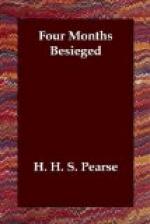But many people have not the moral courage to show caution when warned that shots are coming, so they stand still and take their chance instead of seeking shelter; or possibly it might be more just to say that fatalism in some form arms them with a fortitude which cannot be shaken by shells. Soldiers on duty stick, as a matter of course, to their posts, or go straight on with work that has to be done whatever the dangers may be; but just now I am not thinking so much of them as of civilians and troops in their leisure moments, for whom exposure is not a necessity. The townsfolk can, if they choose, find almost absolute safety by spending their days in cool caverns beside the river, or bomb-proof shelters cleverly constructed near their own houses; and care has been taken by the military authorities to provide every defensive position round the open camp and town with shelter trenches and covered ways, where soldiers off duty may rest secure from the heaviest shell fire. Yet after all there is much to be said in favour of the fatalists who put their trust in a Power greater than human agencies or foresight can control. They, at any rate, do not meet troubles half-way or suffer the terrible depression that leaves its traces on those who pass their days in dark damp caves, and only venture forth at night when danger seems to have passed, though that is by no means certain.
In one of my early telegrams to the Daily News, sent by Kaffir runner, I told briefly how Dr. Stark met his death at a time of apparent security. Descended, I believe, from one of the most famous of West-Country Nonconformists, he held views strongly in sympathy with what he regarded as the legitimate aspirations of an eminently religious community, and he came here as a visitor from England with the avowed




